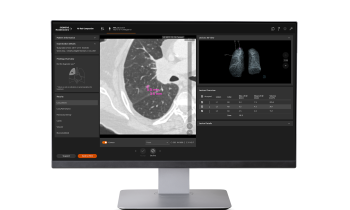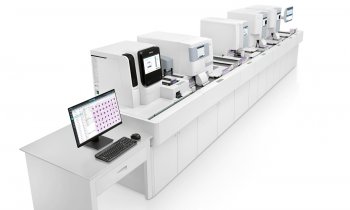Under the microscope
Interview by Michiel Bloemendaal
The Netherlands needs greater integrated care and fuller governmental co-operation with healthcare professionals.

The walls of Professor Robbert Huijsman’s office, on the fourth floor of one of Erasmus University’s buildings, in Rotterdam, are festooned with posters. One of stands out from the rest; it contains a photograph of a battery and the text ‘Erasmus charges you’. Certainly the professor himself is full of energy. He has been a professor at Erasmus for eight years, although he is now only 43 years old. Lecturing on Integrated Care Management, he demonstrates the enjoyment by the manner in which he discusses his subject: passionately! One push on the button and his enthusiasm pours out.
I head straight to the point. How healthy is Holland? His answer is as short as it is powerful: ‘It could be better. No’, he quickly reflected, ‘the situation is not very glorious’. It all very much depends on where you live and that is very disturbing, because the type and quality of care should be uniform and there should be no difference between being admitted to a hospital in Maastricht or Amsterdam. Typically, when determining quality of care it is not just a question of whether one is working according to the latest professional views and guidelines but, even more importantly, how the patient is being addressed and served.
In this last aspect alone, despite all the policy ambitions, there still has not been a complete breakthrough. Consider this from the point of view and feelings of a patient; we should address him, or her, as a fit human being and not as some inferior number in a long row of cases. Also, it is of the utmost importance that various disciplines are attuned to one another in multidisciplinary teams, through which the ‘learning ability’ of organisations will also be improved. Working in teams and banning the competence battle - that’s the point - at all levels in care, among relief workers, hospital teams and other caretakers, as well as the ministry of health.
Care with the neighbours
On our question of how the state of care is delivered in other countries compared with the Netherlands, Professor Huijsman offered two examples. First he briefly sketched briefly the situation in Belgium, while making clear that the situation there does not really differ from that in the Netherlands. There is no single country that has complete control over all aspects of their healthcare systems, he pointed out. Of course there are observable differences in elements. First, the Belgians are more courteous towards their patients, as well as between themselves, giving each other full play, both socially and professionally, and this is recognisable in their healthcare delivery systems.
This does not mean that, in Belgium, as in Holland, a systemic change does not take place. The difference between the Belgians and the Dutch however is, that the Belgians achieve change without the discussions that are so characteristic of the Dutch. Dutch policy discussions can extend over and over, for many years, and then they still hesitate to execute their plans. Even then, it sometimes goes wrong!
‘Next there is the British situation,’ he continued. ‘Healthcare is also good there, and well organised, but has also its own Achilles heel: i.e. a top-down policy, which means it is much easier to implement new regulations, but it does not mean that handling changes in this way creates the necessary support of the professionals.’
Compared with other countries, the Netherlands lacks leadership in healthcare management, both at national and the organisational levels. Without that leadership there will be absolutely no success; but who has the courage to make this a political item?’
Advice
At Erasmus, students are taught and research is carried out - this is no surprise to anyone. It also is no surprise that advice is given, whether demanded or not sought. When we asked the professor whether he ever advises the minister of health, a sort of twisted grin appears on his generally friendly face. ‘I don’t really see that the ministry feels much need for advice from people outside their own circuits in The Hague,’ he responded. ‘Pilots are started, but monitoring and evaluation of these experiments is not very high on the political agenda. Once, I heard a top employee at the ministry state that the vision that everything is now known; that all the knowledge is available and that all we need is implementation in the field. Orders for investigation, given to universities or research institutes, are virtually a past tense. Consultancy firms, with strong ties to the ministry, carry out implementation. The real glitch in working methods is the lack of a systematic agenda for research and development within the healthcare sector. Critically, monitoring and evaluation to improve policy is clearly less present. The ministry could improve its learning ability, by placing research back on the agenda again.’
The future
That things in the Dutch healthcare policy must change is crystal clear to Professor Huijsman. He mentioned as an example the changes in the nursing homes budget. ‘200 million euros extra was presented on a budget of five million euros, which means 200 million euros has to be divided between 350 nursing homes. What a joke! With such an increment, how could we possibly improve the quality of care!’
The government, he emphasised, does realise that the quality of Dutch healthcare is slipping. ‘There is a need for entrepreneurial people and leaders to take care institutes in tow. They must introduce competition as an instrument. This also means that salaries must be higher than average - it’s a matter of supply and demand. If you want a hotshot you must pay’.
Tomorrow’s hospital
‘Excellent, well-qualified people work in Dutch hospitals; they knock themselves out, and earn far more respect than they really get. This holds for doctors, nurses, heads of laboratories and general services alike, they do not get what they deserve.
‘Despite that hard work, they have to ask themselves whether they are working on the right things, and if they are doing those things in the right way. Are the hospitals organised in the right way, or does one put too much trust into old structures, routines, functions and disciplines? Even here an eye must be kept on the process of a patient, from hospital admission right through to discharge and after care. Activity based structures must be changed to process-based, patient-centred chains of care, like clinical care pathways, connected to other suppliers in the whole care continuum. It is time to leave the old system and change from suboptimisation of activities to optimisation of care chains: it is not enough that everyone works as hard as he or she can, but the various services have to do so together, through which optimisation can be realised’.
Good examples of such systemic changes are stroke services or a ‘mamapoli’, he observed. ‘Some years ago it was standard procedure that it took about three months before a treatment plan was made and executed. Nowadays, disease can be diagnosed and a treatment plan presented to a patient, in just one day, just because the efforts of several hospital departments are integrated into a chain approach. This new way of thinking about processes, instead of single activities, requires three cornerstones. First, one must think from the patient’s viewpoint; second, one must think look at the best available knowledge. Finally, the involved disciplines must co-operate closely, in multidisciplinary teams, which cross over the traditional boundaries between disciplines, departments and organisations’.
Training
Do not suggest to Professor Huijsman that such a development cannot be realised overnight. On one hand, the outlined change in working and thinking must be introduced into hospitals; on the other, a lot has to be done through education. In 2002, Erasmus University had already begun, by introducing a master’s degree in care management. A student who opts for this course (the first in Holland) is trained to be a bachelor of health sciences, in which he/she must tackle law, economics, healthcare insurance, care management and social-medical sciences. In the second phase, the master phase, a choice can be made in three directions: care management; health economics, policy & law, or health services research.
For Professor Huijsman, everything should then improve - as long the ministry of health takes the advice!
02.08.2006










